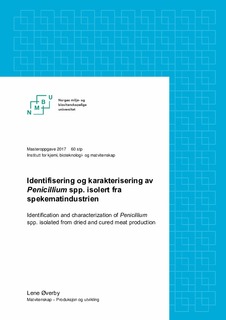| dc.contributor.advisor | Schirmer, Bjørn | |
| dc.contributor.advisor | Østlie, Hilde | |
| dc.contributor.advisor | Kure, Cathrine Finne | |
| dc.contributor.author | Øverby, Lene | |
| dc.date.accessioned | 2017-09-09T13:17:05Z | |
| dc.date.available | 2017-09-09T13:17:05Z | |
| dc.date.issued | 2017 | |
| dc.identifier.uri | http://hdl.handle.net/11250/2453855 | |
| dc.description.abstract | Det produseres årlig rundt 2000 tonn pinnekjøtt i Norge med en verdi på over 400 millioner kroner. I 2013 måtte Nortura SA tilbakekalle over 230 tonn pinnekjøtt fra markedet på grunn av muggsopp på deler av partiet. Muggsopp er ansett som den viktigste årsaken til ødeleggelse av spekemat. For å kunne oppdage uønsket muggsopp på et tidlig stadium vil det være behov for mer effektive metoder for identifisering. Det vil også være nyttig med kunnskap om utvalgte muggsoppers egenskaper som eventuelt kan benyttes for å hemme eller hindre oppvekst av slik problemmugg.
Målet med denne oppgaven var å undersøke hvor følsomme metodene «Fourier Transform Infrared Spectroscopy» (FT-IR) og «Matrix-Assisted Laser Desorption/Ionization Time-Of-Flight Mass Spectroscopy» (MALDI-TOF MS) er for klassifisering av problemmugg isolert fra spekematindustrien, samt å undersøke hvordan ulike vekstbetingelser som frysing, innhold av salt (NaCl) og ulik fuktighet påvirker artene Penicillium solitum, Penicillium nordicum og Penicillium chrysogenum.
I denne studien ble det benyttet til sammen 142 isolater til klassifisering med FT-IR og MALDI-TOF. Resultatene for FT-IR metoden viste et samsvar på 92,2 % artsnivå og 99,5 % på slektsnivå mellom metoden og tidligere identifisering med tradisjonell metode. 36 av 59 isolater ble klassifisert med høy grad av identifikasjon med MALDI-TOF, men bare ni av disse ble klassifisert i samsvar med den tidligere identifiseringen med tradisjonell metode og/eller sekvensering. I vekstforsøkene ble det målt radius av koloniene for å dokumentere veksten under de forskjellige betingelsene, samt at det ble tatt bilder av koloniutseende. Av artene viste resultatene at P. solitum ble mest hemmet av saltkonsentrasjonene i forhold til kontrollen, men høyere saltkonsentrasjon ga minst vekst for alle isolatene. Det ble også vist at isolatene ble hemmet av frysing, og de som ble fryst tre dager etter inokulering ble mest hemmet. Innfrysning rett etter inokulering ga isolatene mer «strøvekst» enn isolater fryst tre døgn etter inokulering.
Identifisering av muggsopp med FT-IR og MALDI-TOF viste lovende resultater, men det mangler tilstrekkelig databaser for å gjøre klassifiseringen god nok. Forandring i vekstbetingelsene til P. solitum, P. nordicum og P. chrysogenum påvirket isolatene i forskjellig grad, og alle ble til dels hemmet av både salt (NaCl) og frysing. | nb_NO |
| dc.description.abstract | Annually it is produced around 2000 tonnes of “pinnekjøtt” in Norway with a value of over 400 million Norwegian kroner. In 2013, Nortura SA had to recall over 230 tonnes of “pinnekjøtt” from the market due to mould growth on the product. Mould growth is considered the main cause of spoilage of dry-cured meat. In order to detect unwanted growth of mould at an early stage, more efficient methods of identification will be needed. It will also be helpful with knowledge of selected properties of mould that may be used to inhibit or prevent the growth of spoilage fungi.
The aim of this study was to investigate how sensitive Fourier Transform Infrared Spectroscopy (FT-IR) and Matrix-Assisted Laser Desorption / Ionization Time-Of-Flight Mass Spectroscopy (MALDI-TOF MS) are for the classification of unwanted mould isolated from the food industry, as well as investigating how different growth conditions such as freezing, salt content (NaCl) and different humidity the species Penicillium solitum, Penicillium nordicum and Penicillium chrysogenum.
In this study, 142 isolates were used for classification with FT-IR and MALDI-TOF. The results for the FT-IR method showed a compliance of 92.2% species level and 99.5% at genus level between the method and earlier identification using traditional methodology and/or sequencing. 36 out of 59 isolates were classified with a high identification with MALDI-TOF, but only nine of them were identified in accordance with the previous identification with traditional method and / or sequencing. In the growth experiments, the radius of the colonies was measured to document the growth under the various conditions, and photographs of the appearance of the colonies were taken. Among the species, the results showed that P. solitum was inhibited the most by the salt concentrations compared to the control, but higher salt concentrations gave less growth for all isolates. It was also shown that the isolates were inhibited by freezing and those who were frozen three days after inoculation were most inhibited. Freezing immediately after inoculation resulted more scattered growth than isolates frozen three days after inoculation.
Identification of spoilage fungi with FT-IR and MALDI-TOF showed promising results, but there are insufficient databases to make the classification good enough. Changes in the growth conditions of P. solitum, P. nordicum and P. chrysogenum affected the isolates in different degree, but all were partly inhibited by both salt (NaCl) and freezing. | nb_NO |
| dc.language.iso | nob | nb_NO |
| dc.publisher | Norwegian University of Life Sciences, Ås | nb_NO |
| dc.rights | Attribution-NonCommercial-NoDerivatives 4.0 Internasjonal | * |
| dc.rights.uri | http://creativecommons.org/licenses/by-nc-nd/4.0/deed.no | * |
| dc.subject | Penicillium | nb_NO |
| dc.subject | Pinnekjøtt | nb_NO |
| dc.subject | Spekemat | nb_NO |
| dc.title | Identifisering og karakterisering av Penicillium spp. isolert fra spekematindustrien | nb_NO |
| dc.title.alternative | Identification and characterization of Penicillium spp. isolated from dried and cured meat production | nb_NO |
| dc.type | Master thesis | nb_NO |
| dc.source.pagenumber | 84 | nb_NO |
| dc.description.localcode | M-MAT | nb_NO |

